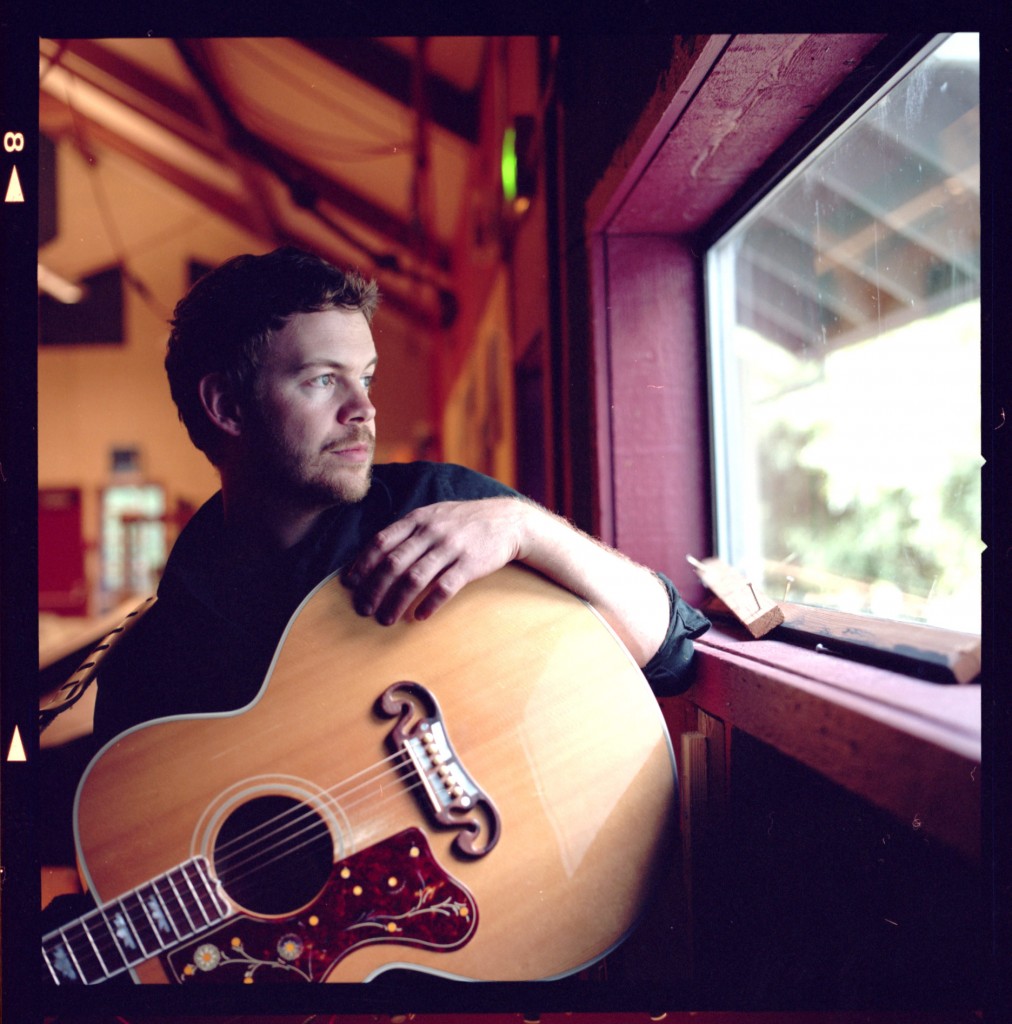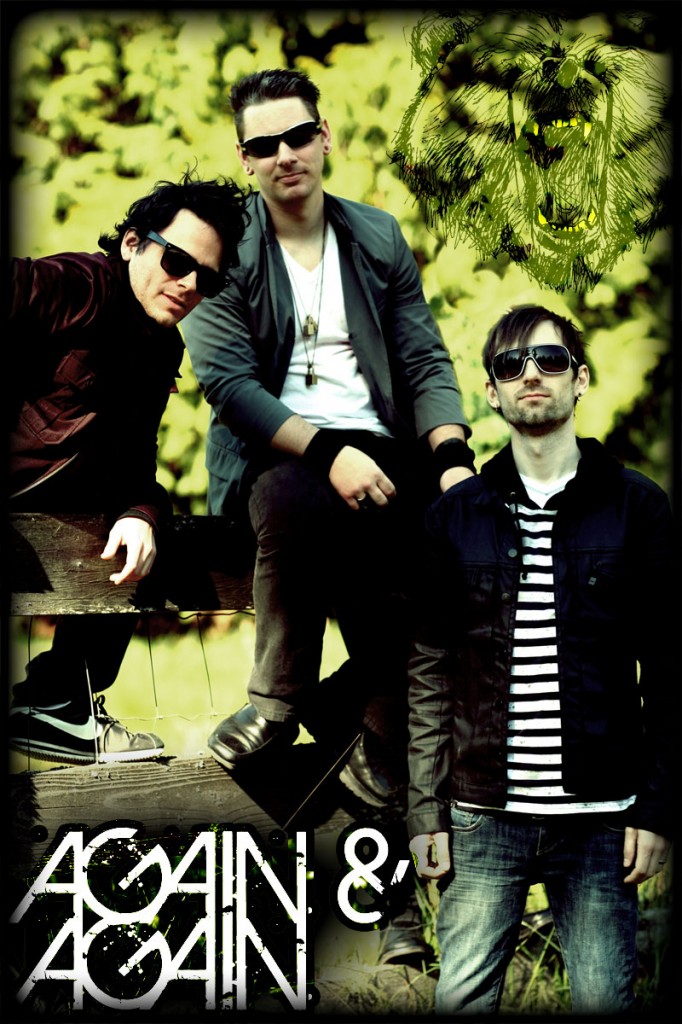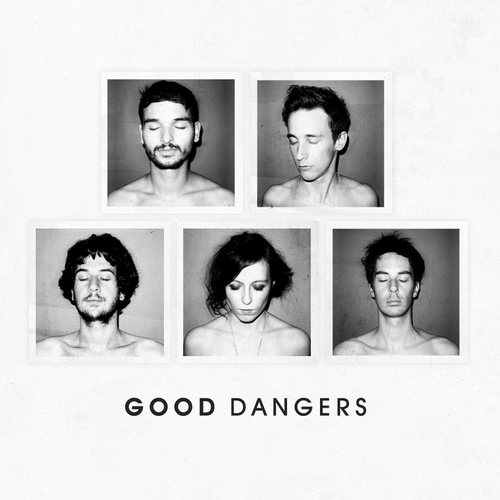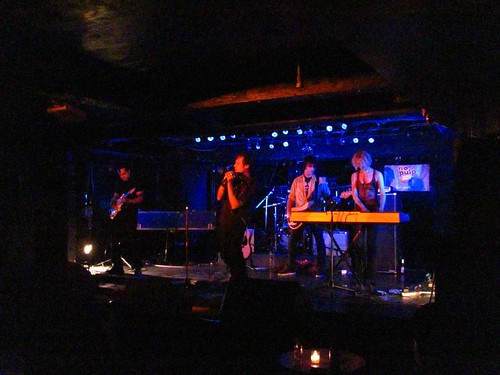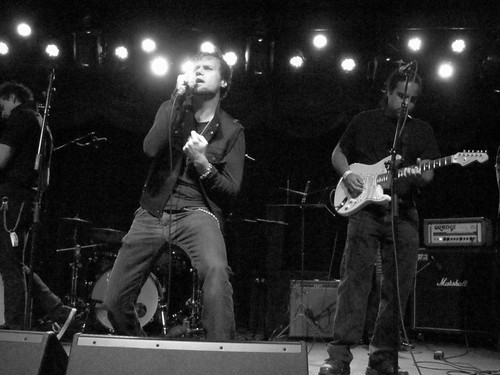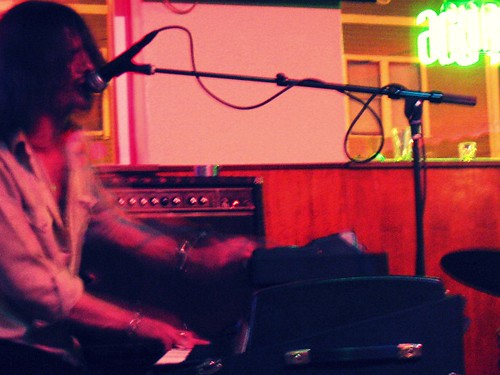
John Wesley Myers, a.k.a. James Leg, gives off a vibe that reaches across a crowded bar. Stepping into the Happy Dog, a popular neighborhood bar on Cleveland’s west side, packed wall-to-wall with the usual cast of St. Patrick’s Day goofy, green-clad revellers, it took less than a second to spot Myers at the bar. It wasn’t that he was better-looking or more nicely dressed than most anyone else in the place – though there might have been that, too – it is more a natural air that says, “You should pay attention to this guy.”
And you should. From his band the Black Diamond Heavies to his work with the Immortal Lee County Killers and contributions to albums by Scott H. Biram and Left Lane Cruiser on up to his new solo album, Solitary Pleasure, Myers is partially responsible for doling out some of the dirtiest, howlingest, most searing punk-ass blues ever produced. And he’s got more just waiting to pour out.
After a full-on drunk young man screeched excitedly in Myers face (to which Myers, never less than cool, turned to me and simply said, “St. Patrick’s Day”), we made ourselves comfortable on a couch outside a downstairs bathroom (thanks to Andy Jody for finding us a relatively quiet spot) and talked about lost loves, tent revivals, dual personalities and music, music, music.
What prompted the solo album?
Well, the Black Diamond Heavies, we’ve been hitting it, like, 260 days a year for 6 years now, and we were tired. We needed to be around other people for a minute, you know? And we’re not done. We’ve got another record in mind, if not in the works yet. And Van [Campbell], the drummer, was recently married, and so he kinda needed to stay closer to home. And I have nothing, so I just wanted to stay on the road. But in order to do that, I didn’t want to just go out and sell Black Diamond Heavies stuff without Van there. And I had all these songs, also, that… the Black Diamond Heavies, we had messed around with some of these songs, and they just weren’t really Black Diamond Heavies songs. Black Diamond Heavies have a sound that’s kinda sacred to me, like this real raw, driving, lo-fi thing, which is great, but I didn’t want to fuck with that sound too much. Some of this newer stuff, it’s a different thing. And so the solo record gave me an opportunity to kinda… And I’ve got another solo record, too. I’d like to some… I’d like to do some [whispers] country. I don’t know…
[gasp, laughter]
You know? I’m from Texas, I grew up on that shit. But in the same style, you know, and that’s something the Black Diamond Heavies really couldn’t, or shouldn’t do.
I noticed you seem to be branching out on this album. There’s a lot more gospel and the piano…
The piano, that’s something specifically like… the Heavies, we’ve used the piano as an accent but not as a main instrument. It just doesn’t work. And, hell, I learned on the piano. I play a Fender Rhodes, but I’m a piano player, and so this was nice. There’s more piano on this record than Rhodes, I think – I think that’s right – which was really cool.
So, you read the post I did. I felt like the album seemed like a man realizing his faults and getting ready to take steps to redemption – how accurate was that?
I think the first part’s probably right on, a man realizing his faults. Steps toward redemption… You know, one day at a time? [laughter] It’s been a rough year, a lot of shit’s happened this year. What do they say… it’s been a long time since I was at those meetings… recognizing is the first step or something like that?
So, just curious, “No License (Song for the Caged Bird)”: Is that somebody?
Yeah, that’s somebody. That was the first girl I fell in love with. I was 19, she was 16, so it was a little… eh. You know. But she was sneaking into the bars because she looked older. Actually, since she’s straightened away, she goes to church every day, she’s got a family. I wrote that song years ago, many years ago, and never recorded it, never did anything with it. When I was doing this solo record, I was going through some words that I’d written or whatever, and I found that song, and it was finished, and I just touched it up a little bit. And she hasn’t heard it. And I don’t know if I should play it for her. That was a long time ago, and I don’t want to…
Things are much different now.
Yeah, exactly. But, you know, at the time, she had some problems, she went to jail for it, and you know… [laughter] As you do.
[laughter] It’s a great song, so much fun.
Thank you. Because the situation at the time was such a circus, it was such a circus, and at the time, it was funny, I had been clean and sober for, like, 5 years. So we were young lovers, and then we didn’t see each other for a few years, and then our paths crossed again. And she was in a lot of trouble, and I was in the middle of being totally straight. And I was trying to kind of save her, you know? And it was such a circus, hence the beginning – wah wah waaah – and the end with the Three Stooges. It was fun to be able to – again, that something that the Heavies really couldn’t do. The Heavies are very serious. It was fun to be able to fuck around a little bit.
“Whatever It Takes”, the singing on that – was that just something that you… because it’s so different from your usually singing style.
That was 5 o’clock in the morning, was recording… And I don’t sing like that. I wish I could. I can’t live, I rarely can in the studio, but I’d been trying to nail that song. We had already laid down the music, and I was going to overdub the vocals. And all night, it was taking hours, and I was trying to get it, trying to get it, and it wasn’t working, to the point where I had blown my voice out. And I was, like, ‘Wait a minute, let’s try something, let’s move the mic up really, really close.” At that point, my voice was blown out, and I could sing. I don’t know if that makes sense, but…
Yeah.
Normally, I can’t sing. I have to… just the energy of the music or whatever it is, like it has to be ferocious. But, at that point, I didn’t have any more ferociousness, and so we just moved the mic really close… And it felt, too, like that’s the way that song was supposed to be sung because that’s a different girl. And that one fucked me up pretty good. So, I don’t know… it’s honest, which is all I want from music, and I hope that people would hear that and feel that.
Once I got passed the jarring effect of the nice, sweet voice after all the rough voice, it is. It feels very honest.
It’s the most vulnerable I think I’ve ever been. Which, you know, I was a little insecure after listening to it, but it’s honest. That’s all you can hope for, I think.
Your father was a Baptist preacher, strict household – I love the story about the moment you had when you know you wanted to be a rock musician. [Leg saw a Christian propaganda presentation denouncing the Satanic influences in rock music.]
At the tent revival, yeah. That was amazing. And my poor father… there’s a couple of reasons I go by James Leg, but that’s one of the reasons. My dad’s still a preacher. And I was ordained. I’ve stood in the pulpit on Sunday morning and preached. But my dad’s still, that’s his thing, and maybe it’s a little embarrassing for him. But it’s funny because that moment didn’t turn out the way he wanted it to at all. [laughter] I had never heard – he had a Platters greatest hits record, he had a Charles Brown 45, “Please Come Home for Christmas”, and he had a Waylon Jennings record… it’s just Waylon Jennings, I don’t think it’s a greatest hits, but Willie’s all over it, and it’s, like, “Luckenbach, Texas,” “Good Hearted Woman” and stuff like that. Those were the only three secular records in the house. And he had caught me listening to that when I was about 14. I’d been staying home alone, and he figured out I’d been listening to them. He took those out in the backyard, onto a tree stump, and set them on fire to release the demons that were coming into his house to get his children.
Now, after that, that had been the only secular – the fucking Platters, a Charles Brown Christmas song and Waylon Jennings – that had been the only secular music I’d heard. Well, then this tent revival came along, and… whoa. You know? And they were just playing little clips… they were showing pictures of album covers and playing little clips of songs and… I don’t know, it turned me on. The Stones, Prince, Van Halen, Ozzy Osbourne, Alice Cooper, AC/DC.
It’s like a Who’s Who.
Yeah. The Beatles even! Everything! Like, everything. After that, then there’s the whole thing of people running around in circles, screaming gibberish and the whole thing.
I went to a Christian college for a year…
Really? Which one?
Kentucky Christian College in Grayson.
Okay, yeah, I’m kind of familiar.
I did the born-again thing for a little while.
Yeah. I tried it out. There’s good money in it.
[laughter] But I remember they showed us one of those things and how people who wear lots of black and silver jewelry [calling attention to my black clothes and silver jewelry] were Satanists and how there were all these hidden messages in “Hotel California” and all that stuff.
Yeah, the whole thing.
Just the most insane stuff.
In that tent revival, they played “Another One Bites the Dust” by Queen, backwards, and supposedly it says, “Marijuana, marijuana, decide to smoke marijuana.” Which, I checked it out after that!
[laughter]
I don’t even know, I’ve never played it backwards, I don’t know if it actually says that, but they did it that night. It even had a tune in it, it was kind of cool.
It’s cool, though, because the same – and, man, I have been in those tent revivals, and even in other churches, and felt it. You can feel it -you know, if you’ve been, you can feel some shit.
Yeah.
And it’s the same thing as a good rock show. It’s the same thing.
Yeah, absolutely. So, when you were first able to listen to secular music without inhibition, was it a free-for-all? Did you have to get your hands on everything?
It was a free-for-all, and I had to listen to a bunch of bullshit and go through it and then figure out it was bullshit and then get to something that… you know what I mean? Because I was really naïve. I had to listen to a bunch of bullshit before I found what was fucking right on.
How old were you when you got to do that?
I was 16, 17? Some of the bullshit, I know that’s what you want to know.
[laughter]
I’ve got to figure out what I want to tell you on that. [laughter] You know, Def Leppard. They were huge at the time.
Fortunately, right out of the bat, I hooked up with some buddies who were heavy metal heads. And they were all into Black Sabbath and shit like that. RATT and stuff like this that I could listen to and find qualities in that I’m still into, but through that, found the Stones. Through the Stones, found Muddy Waters, John Lee Hooker, Lightnin’ Hopkins, Otis Spann, Hound Dog Taylor, shit that connected more with where I was already coming from. I had to take a little detour and check out a bunch of heavy metal first.
I found punk only later, after the blues and everything. Punk’s the same attitude as blues, really, it’s just a different voice.
All along the way, there’ve been people that I’ve encountered that have been, like, “You need to hear this.” Guideposts.
I think that’s how we all do it.
I think so, too.
So, you have a very… right now you look very nice, and you’re a very nice person, but you have this intimidating look about you, and you write these badass songs. Do you find that people have a skewed perception of you from your music?
Yeah. As they should. Maybe it’s a Gemini thing, maybe it’s a… drug addict thing, maybe it’s a… I don’t know what it is, but there is another person that I try to keep sequestered. And I try to vent that on stage, and that keeps me from getting into trouble off stage. But that shit’s real.
Are people a little hesitant when they meet you?
Sometimes, yeah. Which, I don’t want that. I don’t want people to be afraid.
And you are very approachable.
Thank you. I would hope so.
There’s some shit that people don’t know, and that I wouldn’t tell people, that happens often. I don’t know how to explain it, but it’s definitely two people.
You grew up in Texas. Now you’re – are you still in Chattanooga?
No, I’m kind of in the van right now. I was born in Texas – I spent, like, 6 years there – moved to Chattanooga, grew up in Chattanooga mostly. I got kicked out of my house when I was 17, went back to Texas, stayed with my grandfather, who was dying. Was there for a year or so. After that, I just moved around.
Chattanooga’s kind of always been homebase even though I have no family there now. Southeast Tennessee, southeast Texas, that’s kind of my bases. I checked out Kansas City for a year or two. I was in Paris for a while – “Whatever It Takes”, that song, that girl’s in Paris. Where else? St. Louis for a minute. Cincinnati since July. I’ve been around. I live in my van.
I had a cabin in Wildwood, Georgia, which is basically Chattanooga, Tennessee. I had a cabin there for years, and I moved out of there almost two years ago, and I’ve just been in the van since then.
Do the different places have different effects on your music?
Yeah, I think so. I mean, it’s all experience, but the different cities… Kansas City’s the home of jazz. Kansas City, Charlie Parker’s from there, right? I think so. [Ed. note – Confirmed: Parker was born in Kansas City.] St. Louis, Chuck Berry’s from there. And I would go to these people’s homes.
Port Arthur, Texas, where I’m from, ain’t got shit. They’ve got Johnny Winter and Janis Joplin. That’s what they’ve got.
Black Diamond Heavies, the Immortal Lee County Killers, you’ve done some work with Left Lane Cruiser, Scott H. Biram – are there any other collaborations we should know about?
Most recently, Left Lane Cruiser, their brand new record, I did five tracks with them. I did three songs with Scott on his last record – I think he’s got a new one coming up. There’s a really good pop-punk band called the Future Virgins. They’ve got a record that’s just about to drop, and I did four songs with them.
And… Cut in the Hill Gang. Do you know that band? They’re from Cincinnati. It’s Johnny Walker from the Soledad Brothers, Reuben Glaser, who was the frontman of Pearlene, Lance Kaufman, who’s the frontman of this rockabilly band called StarDevils, and then myself. So it was four frontmen, and… when the Soledad Brothers split up, Brian Olive did his own thing, and Johnnie Walker started Cut in the Hill Gang. He’s a doctor of medicine now, so it’s kind of a hobby for him. But anyway, we got four frontmen together, we made a record, it’s on Glitterhouse Records. Specifically, Stag-O-Lee Records, which is to Glitterhouse as Alive is to Bomp. Glitterhouse is the biggest label in, I think maybe Europe, but definitely Germany.
So, we made a record called Mean Black Cat in August, and it’s a fucking amazing record. Check it out, Mean Black Cat, Cut in the Hill Gang. And it’s a shame because it’s only in Europe, and nobody in America is going to fucking hear it. Because they don’t have distribution over here, and it’s available online, but nobody’s going to hear it.
An Ohio-based band, I need to hear that!
I know. It’s a Cincinnati-based band. And there’s been some talk, like, Jack at Third Man was interested in it, and there’s been some talk about maybe licensing it over here. But nobody in that band – everybody’s go their own thing going on, so nobody’s really motivated, and it’s a shame because it’s a great record. Glitterhouse commissioned us to do this covers record, basically. They wanted blues-punk covers in our version. So there’s a Hound Dog Taylor song into an MC5 song, there’s a John Lee Hooker song. It’s all raw as hell. It’s a good record.
You kind of already answered this, but plans for the future?
I think we’re going to work on this record for a bit. We’ve basically got to tour the world. I’ve got another James Leg record in mind, we’ve got another Black Diamond Heavies record in mind. AJ, the drummer I’m working with right now, he actually writes and sings songs, and they’re good, so we’ve talked about maybe trying to do something. His stuff is more Stooges style, and I’ve got some of that, too, so we’ve talked about maybe calling it something else and putting out a collaboration record.
So… I don’t know. World domination. Keep making records.
Last question: Because I get my best recommendations from people whose music I love, what have you been listening to lately? Old, new, whatever.
It’s mostly old. I’m ashamed to say I’m not turned on by much new. I’m good friends with Jim Jones Revue, everybody in that band, I’ve known them for a long time. I’m really into what they’re doing right now, and they’re over here in America, they’re in Austin right now. And, actually, I turned down the opportunity to play with them in L.A. for fucking David Letterman. Their keyboard player just quit, and they called me, but I’m going to be in France. So I couldn’t do it, but I turned them on to a good piano player.
I was revisiting Lee Michaels the last couple days. I don’t know if you know Lee Michaels?
It doesn’t sound familiar.
It’s the original rock duo. Lee Michaels played Hammond organ and had a drummer. Good rockin’ shit from the early ’70s. Kind of been on a Kinks kick again lately. It’s funny, everybody says, “You like the Stones or the Beatles?” when actually the answer is the Kinks.
Thank you very much! That’s what I always say, too.
That’s kind of it. I’ve been going through my records. I’ve got thousands of records, and it’s been a rough winter, so I’ve been trying to figure out what I was going to sell and what I was going to keep, so I’ve been listening to a lot of shit. Leon Russell’s always a standard for me. Beefheart because he just fucking died. He died while we were in the studio making this James Leg record. That was pretty intense. That was a wild night.
I’m trying to think of somebody clever to throw out there, but I just can’t.
[laughter] What did you listen to on the drive on the way here?
I have nothing in the van except AM/FM, so we listened to whatever was on FM. We listened to a little NPR on the way up, and then we found a classic rock station that was hitting some Van Halen pretty heavy, which was nice. I’m not ashamed of that.
You guys covered the-
“Ain’t Talkin’ ‘Bout Love”, yeah.
That was great. I was, like, “Wow, I might like Van Halen again.”
[laughter]
What else did we… Oh! I assume it’s Clear Channel, but you know how they’ve started doing these old country stations, what do they call it? Classic country. I don’t know if you’ve got one here.
I don’t think we do.
They’ve got them everywhere now. They’ve got mainstream country, but then there’ll also be a “This is classic country, if you ain’t old enough to something, you ain’t old enough to whatever,” something like that. But anyway, coming up listening to that, we heard Jerry Lee Lewis doing “Honky Tonk Angels,” and that was pretty special. Jerry Lee Lewis.
Someone was saying recently how they felt bad for keyboard players because keyboard players can’t look cool rockin’ the keys.
[laughter]
I’m, like, Jerry Lee?
Well, there’s a bunch of fucking assholes out there giving a few of us a bad name, but Jerry Lee Lewis, Little Richard, Ray Charles, Jon Lord, Lee Michaels – check him out. Even, Booker T., man. Booker T. had a swagger.
So, I would agree with that to a point. There are some. And I ain’t trying to look cool, but I am trying to look mean. [laughter]
You succeed.
Thank you.
Here’s the Cut in the Hill Gang covering Gary U.S. Bonds’ “I Wanna Holler”, with Myers on vocals. I’m listening to my copy of Mean Black Cat right now, and it really is as good as he says it is.






